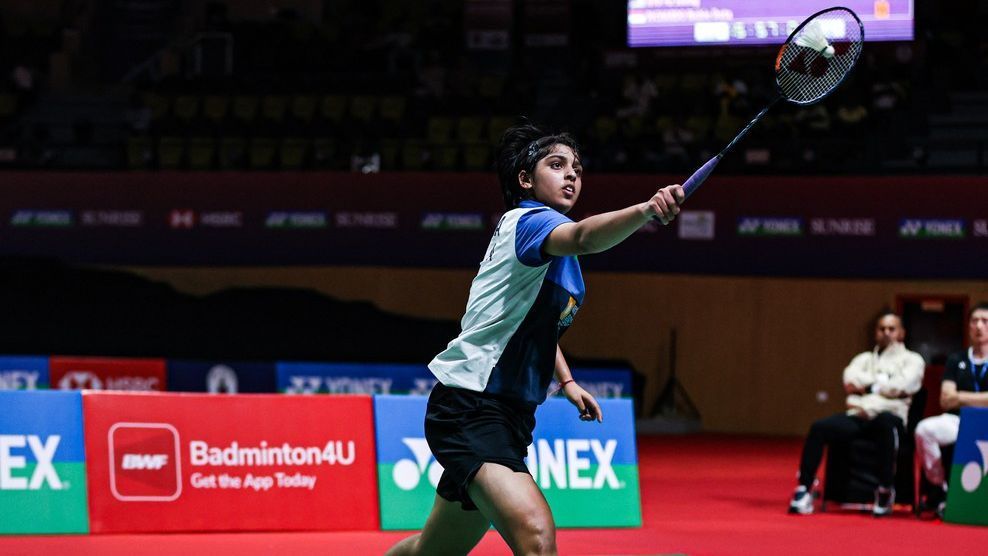An Indian badminton player dominating a Chinese opponent in a semifinal of a major tournament is not a common occurrence. But that’s exactly how 16-year-old Tanvi Sharma became the first Indian woman to reach the final of the BWF World Junior Championship in 17 years. She beat Liu Si Ya 15-11, 15-9 with a near flawless display of her big weapon – the crosscourt smash that skims the side court.
Less than 24 hours ago, Tanvi Sharma was a completely different player, one who had to be scolded by her coach despite a win. It was almost a Jekyll and Hyde personality switch — yesterday she was shaky, and her trademark sideline smashes landed wide while today she was full of crackling strokes, cunning deception, smooth movement and forcing error after error from China’s Asian Junior Championships silver medallist. To the teen’s credit, she did not repeat any of her mistakes from the three-game quarterfinal, finishing her strokes with punchy winners.
“I was very comfortable today, so I was hitting on the line and it was going right in,” a beaming Tanvi said after the match. “I was thinking that I don’t want to hit outside again. My coach just told play inside, whatever you want, just play inside, don’t go for lines.”
But Tanvi went for the it, the lines and the angles, playing her naturally shot-making game and it all clicked on the big stage, with flashing lights and the sounds of drums from the crowd.
What changed in 22 hours?
One, the pressure of winning an elusive girls singles medal — the first milestone of the journey had been achieved. The first Indian woman since Saina Nehwal in 2008 to even reach this stage.
Second, and more importantly, she took a break from training. Taking a break from training before a major semifinal may feel counterproductive, but it’s exactly what Tanvi needed after almost two weeks of competing at the BWF World Junior Championship, from the mixed team stage to going all the way in the individual competition. Some rest, some recovery and her full belief that she can beat a Chinese opponent on her skill alone.
Even in its current reduced scoring format, the continuous playing days arectaking a toll on players. In the quarterfinal, Unnati Hooda looked sluggish after playing almost daily for 10 days. Tanvi too could fall prey to that. So, there were no heavy drills for her, just a basic warm up.
Her coach Park Taesang believes this change is what made the difference. “Yesterday her movement and face looked a bit tired. The day before, she had said let’s train more, so we had played rallies after her match. Yesterday, coach Sachin [Rana] and me, we said no training. Today morning we trained but there were no rallies, just service and dribble training,” Park told reporters after the win. “I asked her how her physical strength was today and she said all good, so tomorrow also we will follow the same, no training.”
At only 16, Tanvi is still young and yet to reach her full physical potential. “Actually, Tanvi has to work on her on-court endurance, compared to the Japanese players. Her aggression, back court and technical skill all very good, already at the senior level. But she has to still build endurance,” said Park.
Top seed Tanvi will take on second-seeded Anyapat Phichitpreechasak of Thailand for the title, who had beaten Unnati Hooda in the quarterfinals. She has played her opponent once before back in 2023 at the Under-17 Asian Junior Championships. “I won that match,” she said with a smile when asked.
Against the Thai, Tanvi may struggle with the lack of speed like she did in her quarterfinals. The pressure of a final at home will also be much worse than that of just confirming a medal. But it’s also her home, quite literally as she has been training at the National Centre for Excellence in Guwahati since September last year. “It’s very special to me that I practice here only and I’m in the finals now. I’ll give my best in tomorrow’s match as well.”
“She knows how important this final is for her career. But her mind is strong, even if her on-court endurance is weak, mentally she will be able to do it,” says Park.
If Tanvi can employ her big weapons with the same self-belief as the semifinal, there’s every chance of India getting a successor to Saina junior legacy at last. For a sport that’s been struggling for bench strength (especially in women’s singles), this means everything… victory on Sunday would just be a monumental cherry on the top.
